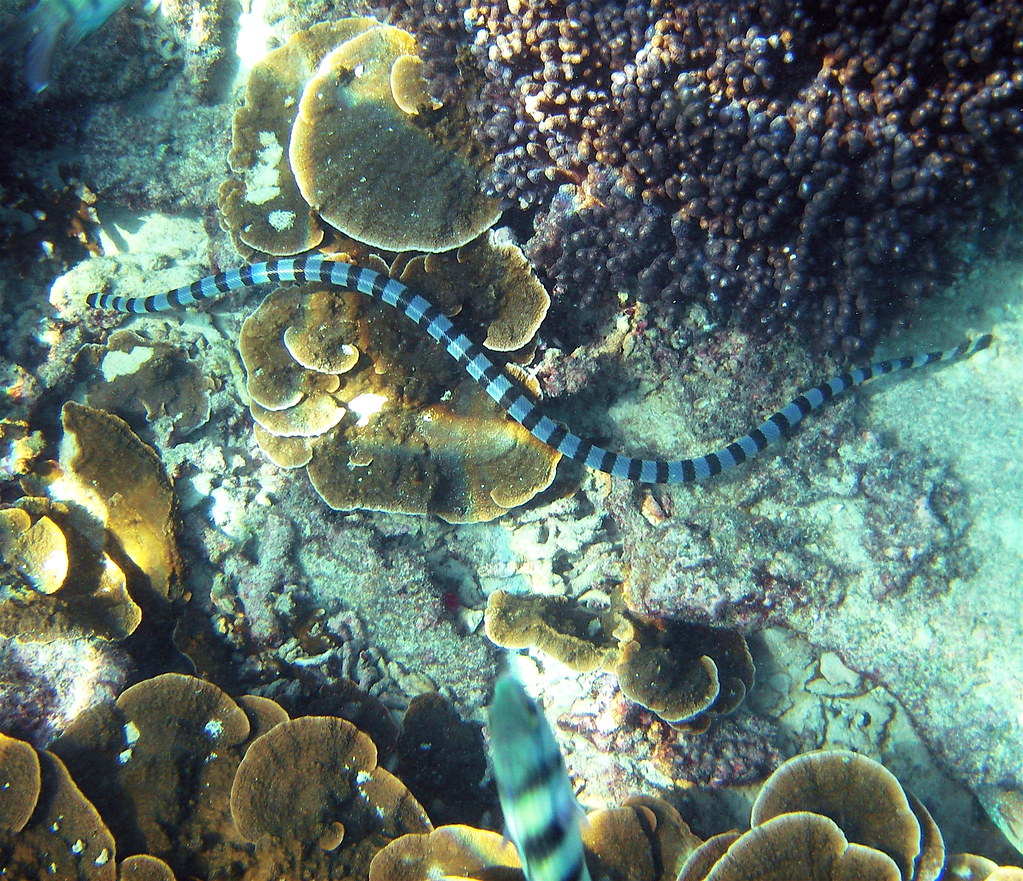
Sea Snakes, Ang Thong, Gulf of Siam, Thailand: photo by Steve Jurvetson, 27 December 2007
Beyond the shadow of the ship
..I watch'd the water-snakes:
They mov'd in tracks of shining white;
And when they rear'd, the elfish light
..Fell off in hoary flakes.
Within the shadow of the ship
..I watch'd their rich attire:
Blue, glossy green, and velvet black
They coil'd and swam; and every track
..Was a flash of golden fire.
O happy living things! no tongue
..Their beauty might declare:
A spring of love gusht from my heart,
..And I bless'd them unaware!
Sure my kind saint took pity on me,
..And I bless'd them unaware.
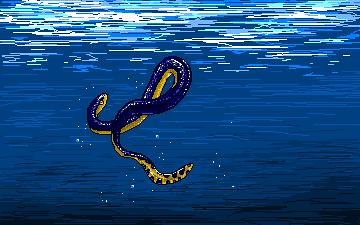
Yellow-bellied Sea Snake (Pelamis platurus): photo by Heather E. Harlow, 14 January 2011

Yellow-bellied Sea Snake (Pelamis platurus): photo by Eugene van der Pijil, 10 September, 2006; image by Ilmari Karonen, 24 October 2007 (USGS/US Dept. of Interior)

Yellow-lipped Sea Krait (Laticauda colubrina), Wakatobi, Indonesia: photo by Craig D, 9 September 2009
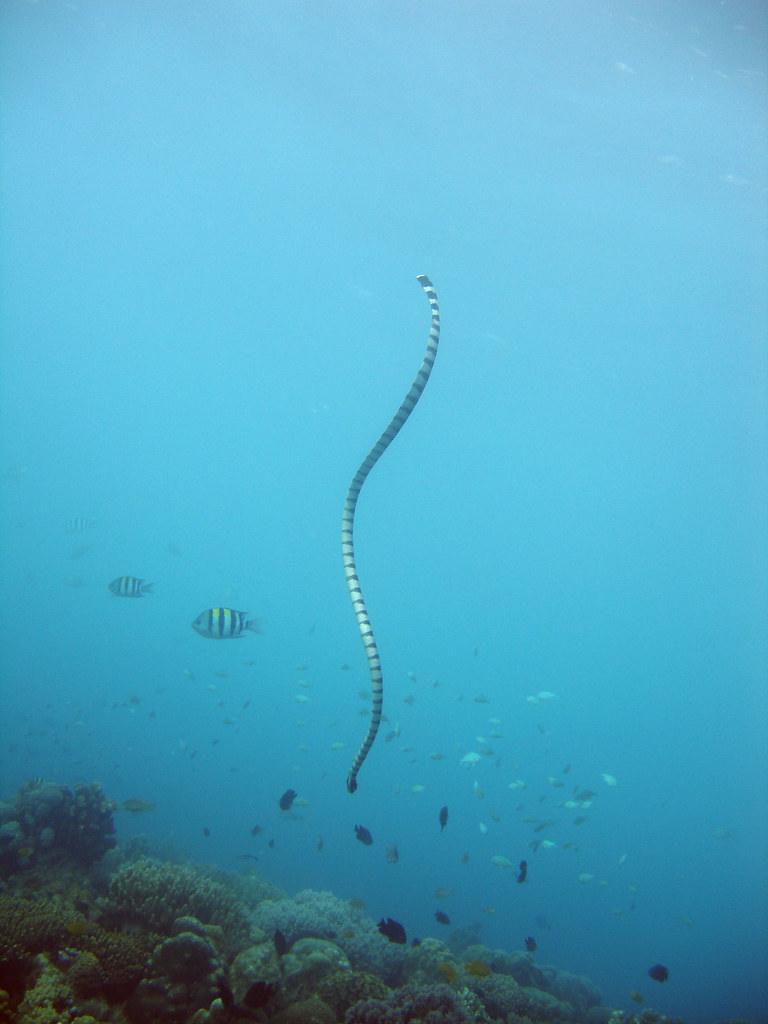
Sea Snake, Guindulman, Central Visayas, Philippines: photo by tim2k, 14 June 2006
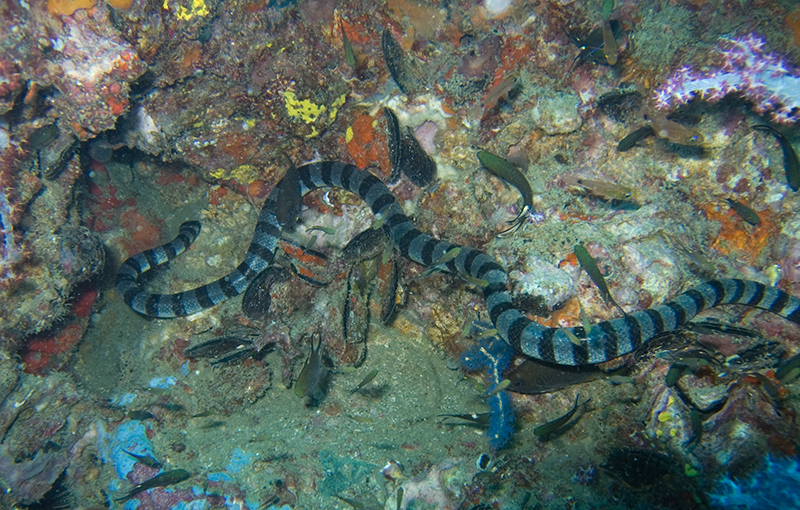
Blue-lipped Sea Krait (Laticauda laticaudata), Anemone Reef, Thailand: photo by Jon Hanson, 29 November 2005
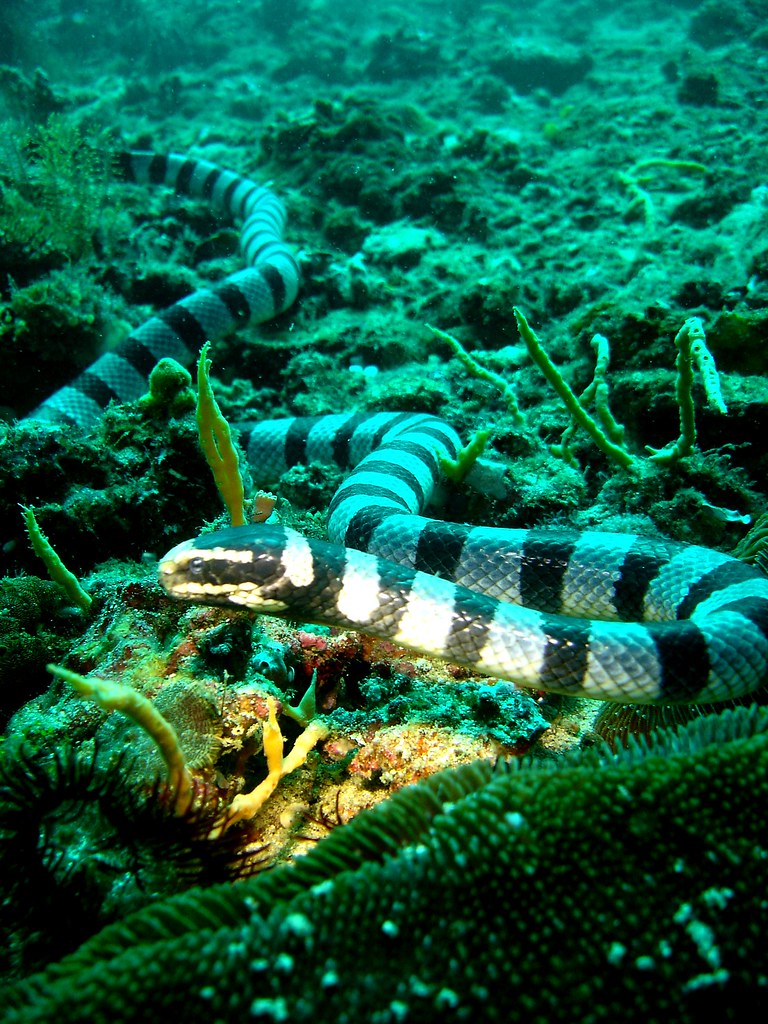
Banded Sea Snake, Tingloy, Mariacaban Island, Philippines: photo by Raymonddy, 3 August 2007
Olive Sea Snake (Aipysurus laevis). Lighthouse, Ribbon Reefs, Great Barrier Reef: photo by Richard Ling, 17 December 2006
From The Rime of the Ancyent Marinere, in Seven Parts (Part IV, ll. 272-287): Samuel Taylor Coleridge, 1797-1798; first published anonymously in Lyrical Ballads (original ed. 1798), with text as here given containing deliberate archaisms of spelling and syntax, intended by the author to allow the poem to be received as a work of unknown age, discovered in manuscript




13 comments:
My heavens, what can have been the source of this curious submarine vision, as though the writer had been just back from a scuba trip to the Gulf of Siam?
(This of course from the same compositional epoch that also entertained the Person from Porlock.)
I think Hardy has a poem about sea snakes or some kind of sea creature, too . . . ? I love the person from Porlock. I think we all have one of those, one who steals the rest of our poems, dreams, and . . .
What was that third thing I was going to say here?
Coleridge could never remember that third thing.
But to give credit where due he never quit trying.
After their one accidental meeting while out walking in April 1819, Keats gave this account of Coleridge in a letter:
"After enquiring by a look whether it would be agreeable, I walked with him at his alderman-afterdinner pace for nearly two miles, I suppose. In those two miles he broached 1,000 things -- let me see if I can give you a list -- Nightingales -- poetry -- on poetic sensation -- Metaphysics -- Different genera and species of Dreams -- Nightmare -- a dream accompanied by a sense of touch -- single and double touch --a dream related -- first and second consciousness -- The difference between Will and Volition - so my [many] metaphysicians from a want of smoking the second consciousness -- monsters -- The Kraken -- Mermaids -- Southey believes in them -- Southey's belief too much diluted -- a Ghost story --Good morning -- I heard his voice as he came towards me -- I heard it as he moved away -- I heard it all the interval -- if it may be called so."
Perhaps Coleridge dropped a clue about the source of the sea-snake vision when, amid his logorheic disquisition on the Heath, he mentioned The Kraken.
The Kraken swims out of the turbid depths of Norse Myth, bearing The Third Thing.
By Coleridge's time seamen's (and old seamen's wives') tales of terrifying Giant Sea Squid were probably part of his poetic kit (along with the rest of the unsorted junk in that amazing palimpsest/toolbox).
An 1810 representation by Denys de Montfort.
That's nothing so pretty as those marvelous sea-snakes of the Mariner, however.
And the Mariner's sea-snakes aren't unkind, the opposite.
And they don't have horrible giant eyeballs.
And really, in the poem, isn't this life-affirming gesture, on the Mariner's part, a compensatory, nay even redemptive act -- counterbalance to the shabby treatment he'd given the albatross by shooting it?
For seven awful days and nights on the doomed ship he has wished only to die. But now the Moon has come up. The sea-snakes are flashing in the moonlight. The Mariner can't help but say Bless. And then the corpse of the albatross drops from his neck at last.
The story surrounding Kubla Khan satisfies the Romantics' love of magnificent ruin. So,whether by accident or design we are compelled to look at the poem with those eyes - The magnificent ruin or "fragment" of a thing that we can only wonder at were it to be whole.
It echoes the deliberate archaic language used by STC in Ye ancient Mariner
But yes such a vivid vision in the days well well before tv and internet
A kind of reversed Expulsion from the Garden of Eden?
For all of it's short duration 'Kubla Khan' seems even more epic in proportion to me than his longer poem 'The Rime'
Thanks Dal for reminding us (and STC's ghost) that his genius is not yet forgot. Yes, when the collaborative plan with Wordsworth went pear-shaped (WW could not keep up w/STC's mad compositional speed, a line would take Willy two days whereas it might take Sam two seconds), he did certainly pick up the ball on the Mariner and move rapidly down field with it. The best part of this mazy run, in my humble view, is the dip in the purgative school-of-sea-snake wonderment.
A relief to know that in addition to the remote and natural/supernatural creatures of his poeticizing imagination he was also cognizant of the less exotic natural beauties that lay closer to home, in fact right there in the garden, as in the comparatively relaxed (nonvisionary) The Lime Tree Bower My Prison.
His generosity of heart gave him a gift of that a poem [This Lime Tree Bower My Prison.]
Thank you .......
I have not daundered down these sometime leafy avenues in a long while ..........
Not to be too much with the birds today ... but the recent outburst of thrush song and the mention today of the skylark in the comments stream reminded me of a blissful moment at the edge of a hayfield bathed in early evening sunlight, aged perhaps 9, standing beside my father, as many skylarks rose and descended singing
I have a memory of the birds tumbling too in a spiraling fall and then rising again to a high hover, but have seen no video evidence for this since. The name ‘lark’ might bear out the acrobatic fall though??
I can’t play these on this computer so I hope that they capture an iota of the experience.
I know I have strayed far from the world of sea snakes
http://www.bbc.co.uk/nature/life/Skylark
Dal,
Sweet memories those...
Rough patch of weather off the North Pacific here now, but nothing a Scots skylark couldn't handle. Here's one high the clouds, in the Borders:
Lark in the wind, Adderstonelee near Hawick
And then of course, from a gentler clime:
Shelley: To a Skylark
And I've always loved this version of the Hoagy Carmichael/Johnny Mercer classic:
Anita O'Day: Skylark (1941)
But having strayed so far in the breeze from those sea-snakes of Coleridge, I did not want to forget -- equal time for the hapless Mariner's unfortunate victim, the variously endangered
Albatross
Nature ... We fuck it up ....
I thought maybe (unlikely) a link to Fleetwood Mac before they super-grouped into music heaven
I enjoyed the links!
My favourite Uncle was a jazz musician I had a dose of everything jazz including this standard from an early age Classical from my father and Folk from my mother
Post a Comment